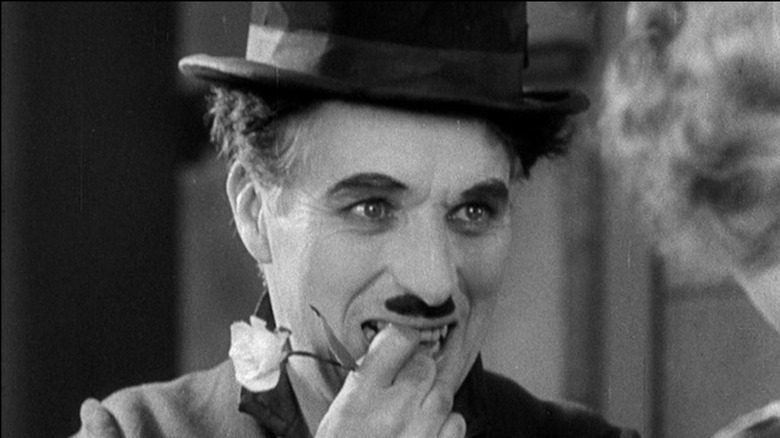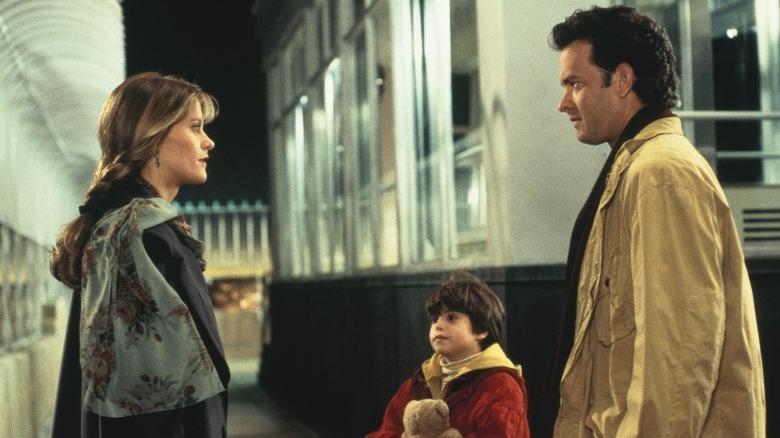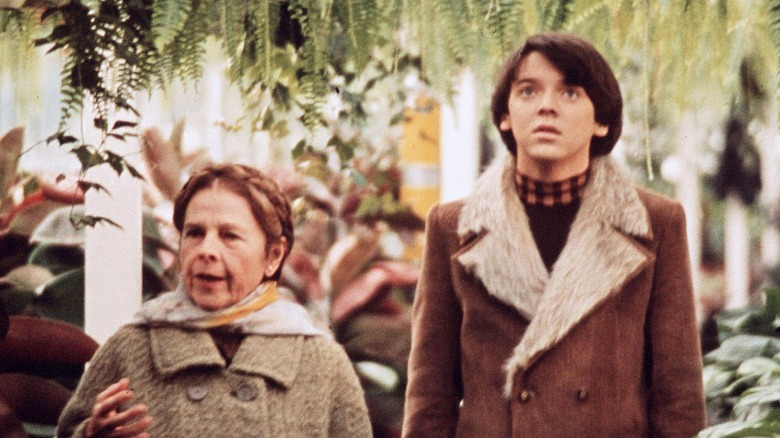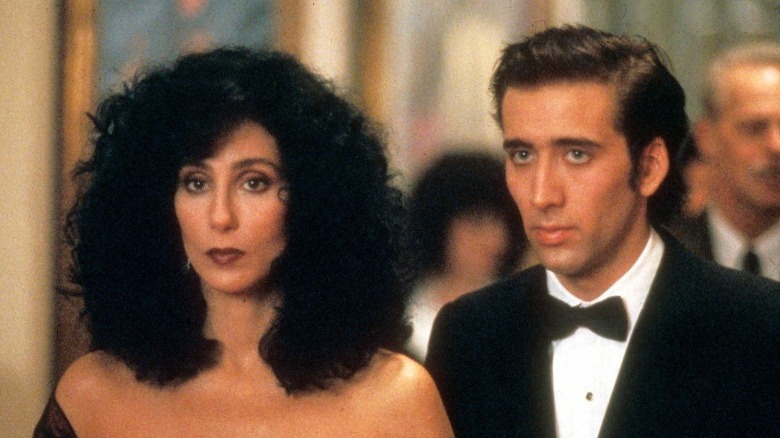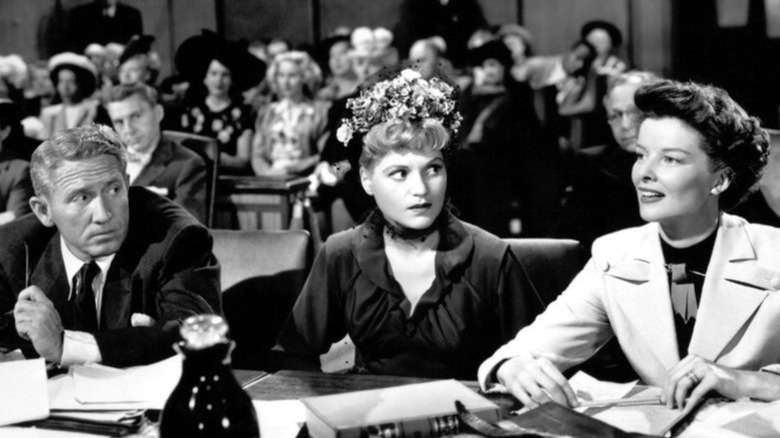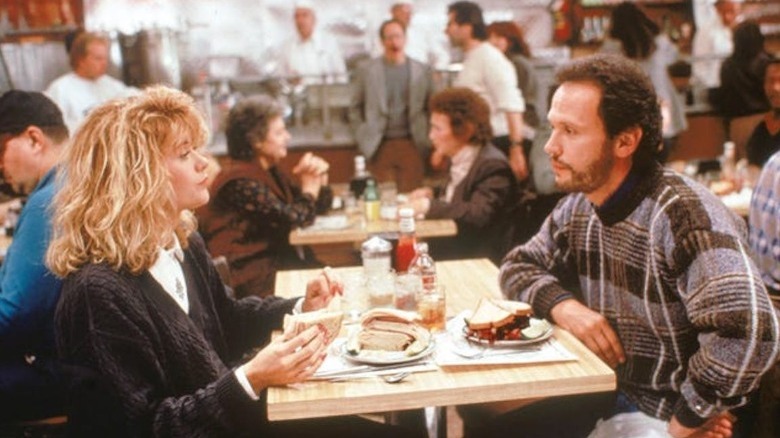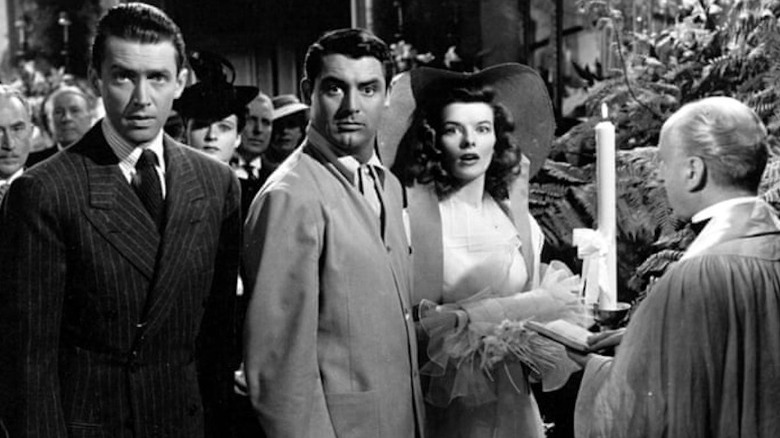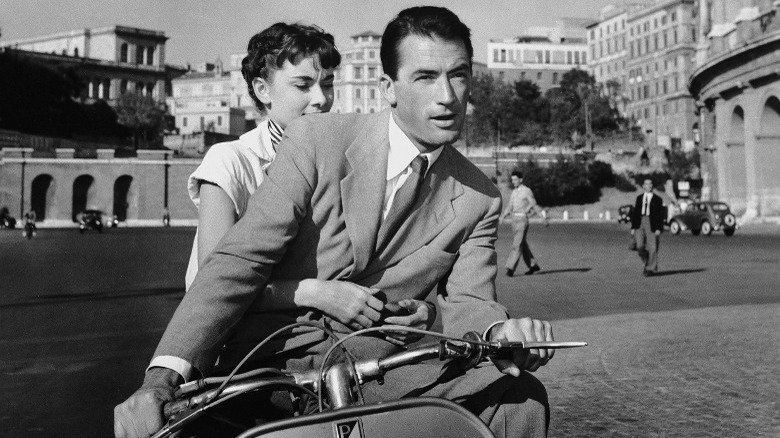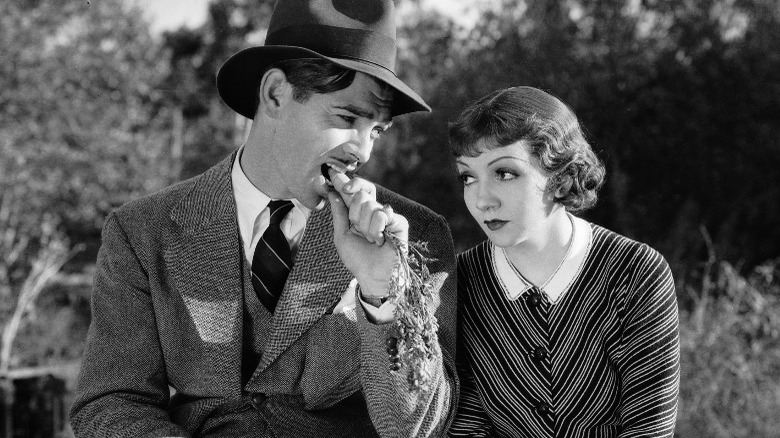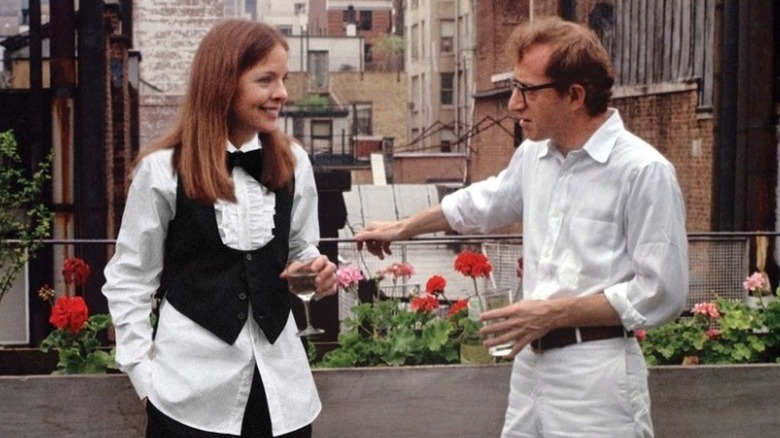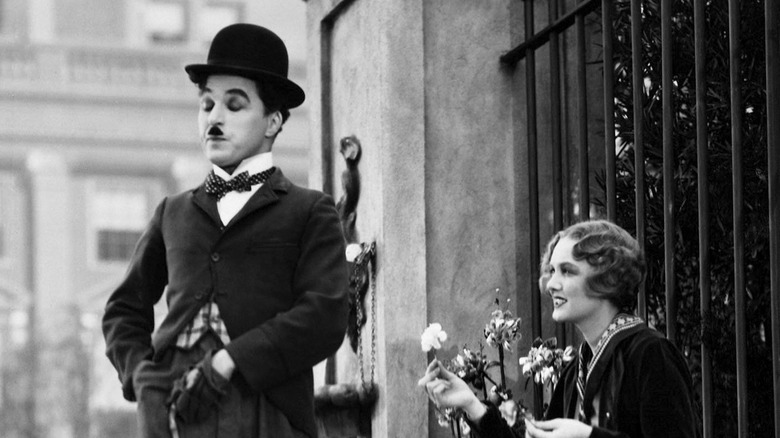The Top 10 Romantic Comedy Movies According To The AFI
There's no feeling on earth quite like falling in love. You experience a new level of vulnerability when you profess your feelings to someone and having it returned is a magical, indescribable experience. It's a feeling that almost everyone is chasing, which is likely why the romantic comedy is one of the cinema's most popular genres, as it effortlessly makes people believe in the power of love. Though the genre has been around for about as long as cinema has existed, it seems more popular now than ever in the age of streaming, with many streamers like Netflix churning out rom-coms like there's no tomorrow.
What exactly makes a romantic comedy? The American Film Institute defines it "as a genre in which the development of a romance leads to comic situations." It's a rather broad definition, but so is the genre, which is all about falling in love with plenty of laughs along the way. With such an endless glut of romantic comedies available, it's really difficult to know if you're about to have your heart soar or get grossed out. Thankfully, the AFI has your back, as they've consulted with hundreds of experts to nail down the genre's finest films. Lets' explore the top 10 romantic comedy movies according to the AFI.
10. Sleepless in Seattle
Few rom-com tropes are as vital as the meet-cute, which is the particular circumstances in which our destined lovers meet. In writer-director Nora Ephron's "Sleepless in Seattle," our pair meets in a convoluted yet remarkably satisfying way. While driving to visit her fiancé on Christmas Eve, journalist Annie Reed (Meg Ryan) hears something strange. A child is on the radio, asking for advice on how he can find his dad a new wife, as his mom passed away from cancer the year prior. This prompts Annie to go on an investigation where she finds herself inexplicably drawn to the man, who uses the moniker Sleepless in Seattle (who's really Sam, a Chicago architect played by the ultimate everyman Tom Hanks) on the radio.
One night, when watching the classic romance "An Affair to Remember," Annie writes a letter to Mr. Seattle, asking him to meet her at the top of the Empire State Building on Valentine's Day. It's certainly one of the more elaborate meet-cutes that the genre has to offer, and what's special about "Sleepless in Seattle" is the way the entire film is actually about the meet-cute itself, joyously taking apart and reconstructing one of the romantic comedies greatest setups. As absurd as it seems, "Sleepless in Seattle" manages to make it feel believable, thanks to the magic of Ephron's script. It's the kind of film that makes you believe in love, however improbable it may seem, and that it's possible to love again.
9. Harold and Maude
As a director, Hal Ashby had a knack for peculiar, off-beat characters, as seen in films like "Being There," "Shampoo," and "The Landlord." Perhaps his most off-kilter movie characters are Harold (Bud Cort), a young man mesmerized by death, and Maude (Ruth Gordon), a concentration camp survivor septuagenarian who lives like each day as if it is her last. Their unexpected friendship forms the basis for 1971's "Harold and Maude," which is without a shadow a doubt the strangest romantic comedy on AFI's list.
Ruth Gordon has one of the more compelling stories in Hollywood. Gordon was an accomplished actor and writer, who co-wrote several scripts with her husband Garson Kanin, including "Adam's Rib," which also has a spot on AFI's list. Gordon won an Oscar for her blood-chilling role in "Rosemary's Baby," and when she was offered the lead role in "Harold and Maude" she was thrilled and confident saying she would "be terrific as Maude –- even more terrific than I was as Minnie Castevet." Gordon was right, as thanks to her gutsy performance, Maude is one of the more intriguing characters in cinema, and it's frankly no wonder that, despite a considerable age gap, Harold is smitten by her.
"Harold and Maude" is a touching and darkly amusing story about the power of living your life no-holds-barred and making every possible moment count while you're here.
8. Moonstruck
Sometimes all it takes to get excited about a film is seeing who's in it. With a cast including Cher, Nicolas Cage, and Olympia Dukakis, how could you not get excited about Norman Jewison's "Moonstruck"? Written by John Patrick Shanley, whose script won the Oscar, "Moonstruck" follows Loretta (Cher), a widowed woman ready to marry again. Afraid of being alone forever, she's preparing to settle for Johnny (Danny Aiello). When she meets Johnny's brother Ronny (Nicolas Cage), she finds herself irresistibly attracted to him, as he's every bit of a fireball as she is.
One of the biggest delights of "Moonstruck" is its wonderful script that pulls no punches and offers some fantastic and unique dialogue. When Loretta meets Johnny, she tells him he's a wolf. When Ronny finds himself unable to resist her anymore, he shouts with unbridled passion, "Get in my bed!" In the morning after their tryst, Loretta is still determined to marry Johnny, and when Ronny still proclaims his love for her, Loretta slaps him across the face and yells, "Snap out of it!" As Helen Sullivan explains for The Guardian, the film is "Human, true, funny -– and hopelessly, gloriously romantic," and also refers to "Moonstruck" as "a glorious contribution to the romantic comedy canon." The film simply oozes with passion and desire and is a charming, funny, and powerful reminder that it is never too late to fall in love.
7. Adam's Rib
One of Hollywood's greatest love stories is the partnership of Katharine Hepburn and Spencer Tracy. The two actors met while working their first film together, "Woman of the Year" in 1942, and fell wildly in love. The two starred in nine films together over 25 years and kept their relationship a secret for just as long, according to Biography. In perhaps their finest film together, George Cukor's "Adam's Rib," the duo play married lawyers who find themselves on opposite sides of the same case. The case is an interesting one, as a woman (Judy Holliday) is accused of shooting her husband who had an affair. Prosecutor Adam (Tracy) and defense attorney Amanda (Hepburn) have a blast dueling each other in court, and their house transforms into a battleground, where the stubborn spouses refuse to back down in their epic battle-of-the-sexes.
Cukor's film features electric chemistry from Hepburn and Tracy, as well as memorable performances from Holliday (who would win an Oscar one year later for "Born Yesterday"), Tom Ewell, and Jean Hagen. The film garnered big-time critical acclaim, with Variety calling it "a bright comedy success, belting over a succession of sophisticated laughs." Modern audiences love "Adam's Rib" as well, with the film currently holding an overwhelmingly positive audience approval rating on Rotten Tomatoes.
6. When Harry Met Sally...
The ultimate will-they-won't-they story, Rob Reiner's 1989 "When Harry Met Sally..." was written by Nora Ephron, making it the second film written by Ephron on AFI's list. The first time we see Harry (Billy Crystal) and Sally (Meg Ryan), the pair are in a car, driving from Chicago to New York City. The two are diametrically opposed to just about everything and debate whatever comes to mind. One thing in particular sets off an argument: Harry suggests men and women can't possibly be friends, as, in Harry's words, "the sex part always gets in the way."
A decade later, the pair meet again and strike up a rather unlikely friendship and find themselves spending all their free time with one another, though the two are convinced they won't end up together romantically. You've seen it all play out before, sure, but the scenario has never been as tantalizing as it is in "When Harry Met Sally..." A big part of that is thanks to Ephron's clever script that takes great pleasure in playing with the tropes and constructs of the romantic comedy genre. It also delivers some truly great moments in cinema history, including the legendary scene at Katz's Deli, where Harry wryly proclaims, "I'll have what she's having." If what she's having is another watch of "When Harry Met Sally...," then count us in.
5. The Philadelphia Story
Tracy Lord (Katharine Hepburn) has it all — fabulous clothes, a beautiful home, and the lifestyle most people can only dream of. She also has not one, not two, but three men vying for her attention -– her ex-husband Dexter Haven (Cary Grant), her fiancee George Kitteredge (John Howard), and Mike Connor (Jimmie Stewart, winning his only Oscar) a tabloid reporter hired to cover her upcoming wedding. A glorious comedy of manners, Donald Ogden Stewart's screenplay keeps the dialogue and jokes coming a mile a minute, and the film is a comical delight.
Hepburn is not only the sensational star of the film, she's also the reason the movie happened at all. Hepburn starred in the play of the same name, and, as Hepburn's biographer, A. Scott Berg explained in a CNN interview, "She very shrewdly bought the film rights for herself." Hepburn then attracted her friend Howard Hughes to direct, and the rest is history. As writer Farran Smith Nehme observes for Criterion, Hepburn's star had been declining, and she was even labeled box office poison. Thankfully, Hepburn's brilliant business sense and talent allowed her to reclaim her star. Hepburn is the Academy Award's most decorated actress, winning a record-breaking four Oscars for best actress. Even though she didn't win for "The Philadelphia Story," it may just be her finest performance.
4. Roman Holiday
A romantic comedy with an extra emphasis on romance, William Wyler's "Roman Holiday" made a superstar out of the truly iconic Audrey Hepburn. "Roman Holiday" earned Hepburn her first Oscar win, while the film also won Oscars for costume design and screenplay for Dalton Trumbo, who Bryan Cranston played in the biopic "Trumbo." The film follows Princess Ann (Hepburn), who is sick and tired of spending her time under constant watch. She manages to escape her embassy sight unseen, and while exploring the streets of Rome, she falls asleep on a bench. It's there she's discovered by Joe Bradley (Gregory Peck), a reporter who doesn't recognize her, and the next day, the two begin their thrilling, whirlwind romance.
"Roman Holiday" makes fantastic use of its locations, and the film was filmed on location in Rome. A scene in which Ann and Joe ride around on a Vespa is simply glorious. As a director, Wyler has a tremendous sense of humanity and is always able to pull career-best performances from his actors. A moment at the mouth of truth provides the perfect blend of heart and laughs, and many fantastic spots feature on the pair's adventure, including the Trevi Fountain, Spanish Steps, and the Colosseum. A perfect rom-com for those who love to travel, "Roman Holiday" is a perfect choice for the number four spot on AFI's list.
3. It Happened One Night
"It Happened One Night" has quite the reputation –- it's the first-ever film to win all five major competitive Oscars. The 1934 romantic comedy took home best actor (Clark Gable), best actress (Claudette Colbert), best adapted screenplay, best director, and best picture, which was such a monumental achievement that only two films have done the same since.
Perhaps the first great romantic comedy, Frank Capra's film is a classic opposites attract story. Colbert plays Ellie, a snotty socialite, and Gable plays Peter, a reporter who's a real man-of-the-people. Ellie finds herself falling for Peter, though she doesn't realize he's on the job, looking for a scoop on her disappearance from home. The film is also part of an amusing urban legend -– when Gable unbuttons his shirt (which was quite shocking at the time), he had a bare chest and had no undershirt, which supposedly caused sales of undershirts to plummet, a claim that was researched by Snopes. Though it's not entirely known whether it really happened, the legend speaks to the hold cinema had on America in the 1930s, and especially to the extraordinary spell Gable cast over audiences.
Capra's films in tremendously funny and wonderfully romantic, perfectly encapsulating the best parts of the romantic comedy genre. Colbert and Capra have some of the best chemistry captured on screen, and the film is edited within an inch of its life. Charming, effervescent, and a total joy, few films have captured America like "It Happened One Night."
2. Annie Hall
Deconstructing a relationship that once was, "Annie Hall" follows the high-strung, neurotic Alvy Singer (Woody Allen, who also wrote and directed the film) tries to piece together the downfall of his relationship with the titular Annie Hall (Diane Keaton). While the film in some circles is thought of as the film that managed to beat "Star Wars" for best picture, "Annie Hall" is a triumph of its own and one of the funniest films ever. The film is full of clever and creative sequences, and one in particular, when Alvy looks back on his childhood classmates, provides plenty of belly laughs. If you've never seen a child say, "I used to be a heroin addict, now I'm a methadone addict," you will after seeing "Annie Hall."
Allen's films have always attracted amazing ensemble casts, and "Annie Hall" is no exception, and Paul Simon, Shelley Duvall, Janet Margolin, Christopher Walken, Tony Roberts, and Carol Kane all feature in the film. Critics were, and remain, extremely high on the film. David Robinson of The Times said, "Annie Hall is as good as it is because its comedy is always on the brink of the minor tragedies of real-life and love." Robinson nails what makes the film so memorable: despite its streaks into absurdist humor, it's a deeply realistic portrait of falling in love and relationships. It's difficult to wholeheartedly recommend a Woody Allen movie these days, but "Annie Hall" is an essential and influential romantic comedy. Do it for Diane Keaton.
1. City Lights
According to the AFI, the romantic comedy has not been improved since Charlie Chaplin's "City Lights" in 1931. While it might seem crazy considering how many rom-coms there have been over the last century, it's true –- "City Lights" really is the greatest romantic comedy ever made. Written by, directed, and starring Chaplin, the film follows the adventures of Chaplin's classic Tramp, an eternally down on his luck man who meets — and immediately falls head over heels for — a blind flower girl (Virginia Cherrill). Upon learning that the girl's grandmother is ill and they are at risk of losing their home, the Tramp puts it upon himself to get enough money to help them, even if he doesn't have any himself.
Chaplin was a true master of mixing comedy with heart, and "City Lights" really has everything, from genius slapstick humor to deep pathos. Chaplin has an unparalleled ability to make the audience feel in a way that likes no other director, and "City Lights" is definitely his most emotional film. We won't spoil the film as it's truly a special experience to discover its magnificence while watching, but its final moments are among the most memorable in cinema history. Of the film's ending, legendary critic James Agee called it "the greatest single piece of acting ever committed to celluloid." A great romantic comedy allows you to laugh, cry, and believe in hope, and no film achieves that better than "City Lights."
